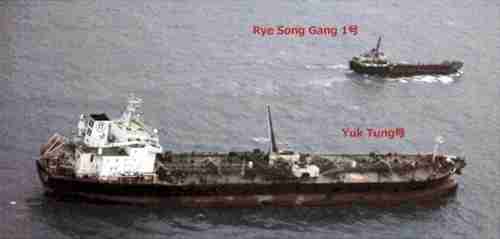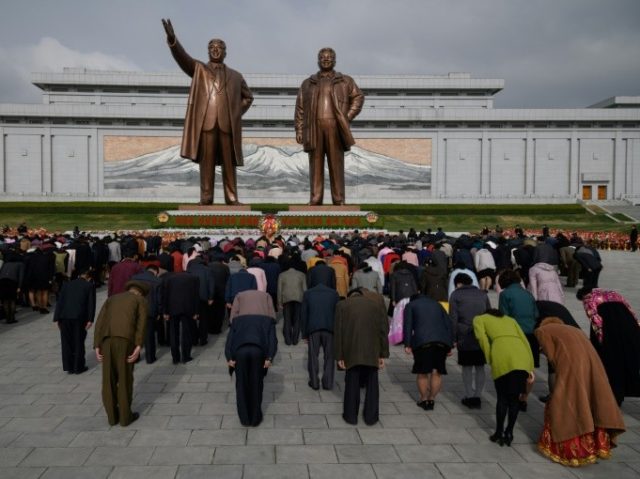This morning’s key headlines from GenerationalDynamics.com
- U.S. issues new sanctions on North Korea over human rights abuses
- North Korea threatens retaliation for the sanctions
- Japan-Korea relations worsen over ‘comfort women’ issue
U.S. issues new sanctions on North Korea over human rights abuses

Japanese surveillance aircraft spots a Dominican-flagged Yuk Tung oil tanker after it transferred fuel to the North Korean-registered Rye Song tanker in the open South China Sea, in violation of sanctions. (AP)
On Monday, the Trump administration announced new sanctions against three senior North Korean officials for human rights abuses and censorship in the country. The new sanctions were in honor of Otto Warmbier, the 22-year-old American college student who died after being released from North Korean custody in June 2017.
According to Treasury Secretary Steven T. Mnuchin:
Treasury is sanctioning senior North Korean officials who direct departments that perpetrate the regime’s brutal state-sponsored censorship activities, human rights violations and abuses, and other abuses in order to suppress and control the population. These sanctions demonstrate the United States’ ongoing support for freedom of expression, and opposition to endemic censorship and human rights abuses. The United States has consistently condemned the North Korean regime for its flagrant and egregious abuses of human rights and fundamental freedoms, and this Administration will continue to take action against human rights abusers around the globe.
The sanctions are for human rights abuses by North Korean organizations that “conduct warrantless searches for unapproved foreign media or content, inspect and confiscate computer content, including external storage devices, and even kidnap defectors or foreign citizens who support human rights in North Korea.” ABC News and US Treasury
North Korea threatens retaliation for the sanctions
North Korea on Sunday harshly condemned the U.S. administration for stepping up sanctions and pressure. and warned of a return to “exchanges of fire” and that the denuclearization process could be blocked forever.
According to the North Korean statement, published by the North Korean news service KCNA:
Now, the international society is unanimous in welcoming the proactive denuclearization steps taken by the DPRK [North Korea] and urging the U.S. to respond to these steps in a corresponding manner. And president Trump avails himself of every possible occasion to state his willingness to improve DPRK-U.S. relations.
Far from the statements of the president, the State Department is instead bent on bringing the DPRK-U.S. relations back to the status of last year which was marked by exchanges of fire. I cannot help but throw doubt on the ulterior motive of the State Department.
If they are a sort of diplomats of “only superpower”, they should at least realize from the past record of the DPRK-U.S. relations that sanctions and pressure would not work against the DPRK.
The United States will not be unaware of the self-evident fact that its threat, blackmail and pressure against the other side cannot be a solution under the relations of pent-up confrontation, mistrust and hostility between the DPRK and the U.S. and deterioration of the situation that might be incurred by these hostile actions would not be beneficial for peace and security of the Korean peninsula and beyond.
Since we know too well that the deep-rooted hostility between the DPRK and the U.S. cannot be redressed overnight, we have been proposing that the DPRK-U.S. relations be improved on a step-by-step approach of resolving what is feasible one by one, by giving priority to confidence building.
If the high-ranking politicians within the U.S. administration including the State Department had calculated that they could drive us into giving up nuclear weapons by way of increasing the anti-DPRK sanctions and pressure and human rights racket to an unprecedented level, which has nothing to do with confidence building, it will count as greatest miscalculation, and it will block the path to denuclearization on the Korean peninsula forever – a result desired by no one.
The U.S. should realize before it is too late that “maximum pressure” would not work against us and take a sincere approach to implementing the Singapore DPRK-U.S. Joint Statement.
North Korea gave this statement a great deal of publicity, so they wanted it to be noticed. And indeed, the international networks all carried it prominently.
An interesting thing about the statement is that it blames the State Department and praises President Trump. This is part of the game and the “charm offensive” that has been going on. This way, the North Koreans can threaten the United States, but encourage Trump to make more concessions.
The statement refers to “the proactive denuclearization steps taken by the DPRK.” There have been no such steps that are not easily reversible. The one big “step” was blowing up the Punggye-ri nuclear test site, but recent satellite imagery indicates that the site is still usable and that several dozen personnel are still working there.
The one major step that the U.S. has requested was a list of all of North Korea’s nuclear weapons and ballistic missiles development sites, but North Korea has refused to provide this list.
The U.S. has also taken a reversible “proactive step” – namely canceling all joint military drills with the South Koreans. However, since no progress was being made down the denuclearization path, the U.S. and South Korea resumed some military drills last month.
The North Koreans have proven to have absolutely no intention of denuclearizing. President Trump has been saying that he is in no hurry to conclude a deal, knowing that the sanctions remain on North Korea and hoping that the sanctions might pressure them to agree to denuclearization. However, as the KCNA statement says, “The U.S. should realize before it is too late that “maximum pressure” would not work against us.”
North Korea has been evading sanctions by transferring oil at sea, despite active surveillance and enforcement by an eight-nation coalition including Australia, Britain, Canada, France, Japan, South Korea, and New Zealand, deploying warships and aircraft to better spot sanctions violations.
As before, it is pretty clear to everyone (except the news media and the general public) that the charm offensive was all a show – that North Korea would never denuclearize and that Trump would never agree to reduce the sanctions. But all sides kept it up because it solves their immediate political problems by “kicking the can down the road” – that is, masking and hiding problems and postponing them until later.
In the meantime, North Korea now has completed a year more nuclear and missile development than it had as of a year ago, with the only restriction that they have not been able to publicly test their latest weapons. It remains to be seen how long this can go on. Reuters and KCNA and Chosun Ilbo (Seoul) and NBC News
Related Articles:
- North Korea ‘Charm Offensive’ appears to have run its course (17-Nov-2018)
- North Korea plays hardball to get sanctions lifted (12-Nov-2018)
- US and South Korea resume some military marine drills, despite North’s objections (05-Nov-2018)
- US imposes new North Korea sanctions on Chinese and Russian shipping companies (17-Aug-2018)
- NY Times publishes a generational analysis of South Korea (30-Jan-2018)
Japan-Korea relations worsen over ‘comfort women’ issue
The question of Korean “comfort women” used by Japanese soldiers during World War II is reaching a boiling point again.
On October 30, South Korea’s supreme court awarded compensation to four Korean citizens forced to work for the Japanese during World War II. The Japanese claim that all such awards were already paid in a settlement concluded in a 1965 treaty.
This has opened up the “comfort women” issue again. In 2015, Japan and Korean concluded a bilateral agreement intended at the time as the “final and irreversible” resolution of the comfort women issue. However, South Korea is now saying that demands from the victims is causing the agreement to “wither.”
I have witnessed an extremely vitriolic disagreement between two people who, fortunately, were disagreeing online and were not in the same room. The disagreement stems from a 1944 U.S. Army report, based on interrogation of “20 Korean Comfort Girls,” which indicates that the girls volunteered for these roles, and they were well-treated by the Japanese soldiers. This issue is certain to be raised again. Japan Today and Diplomat and US Army report (1-Oct-1944)
Related Articles:
- China funds unauthorized anti-Japan comfort woman statue in Manila, Philippines (28-Dec-2017)
- Japan and China in confrontation over comfort women (07-Mar-2007)
- China and Japan really DO hate each other (30-Aug-2013)
KEYS: Generational Dynamics, North Korea, Kim Jong-un, South Korea, Moon Jae-in, Mike Pompeo, Otto Warmbier, Steven T. Mnuchin
Permanent web link to this article
Receive daily World View columns by e-mail

COMMENTS
Please let us know if you're having issues with commenting.